Dentures – Oklahoma City, OK
A Fully Restored and Gorgeous Smile

When you had a full set of teeth, you didn’t have to think twice about eating the foods you love. However, life has changed since you lost your ivories. Now, before consuming certain foods, you’re reminded of the limitations of not having a full set of teeth. Thankfully, there’s a way to maintain a regular diet and enjoy a confidence boost once again. When you visit us at Dental Expressions, our dentists will perform a thorough examination to make sure your oral health is up to par. Then, we’ll move forward with creating the perfect plan for restoring your oral health with the placement of dentures in Oklahoma City. To get the process started, contact us today to schedule an initial visit!
Why Choose Dental Expressions for Dentures?
- High-Quality Materials for Natural-Looking Appearances
- Dental Insurance Welcome & Financing Available
- Decades of Experience From Our Trusted Dentists
The Different Types of Dentures

Because our patients’ needs can vary, we provide different denture placement options. Here are three routes available to you.
Partial Dentures

These can be used if you only have a few teeth missing. The apparatus consists of porcelain prosthetic teeth that fit perfectly into your smile to create a natural-looking appearance.
Full Dentures

If you’re missing an entire row or a full set of teeth, your dentist can craft a full set of dentures that rests directly on the gums. The appliances are held in place with dental adhesive and the natural suction created inside the mouth, but they are still removable.
Implant Dentures

For patients who want a permanent solution, there is the option of receiving implant dentures. Your dentist will insert a series of titanium posts at the jawbone level that mimics the function of the original missing roots. With the addition of abutments later, a set of custom dentures can be created to snap into place.
How Dentures Are Made

After you’ve attended your consultation and Dr. Holman has examined your smile and confirmed that you’re a good candidate for dentures, we can kick off this exciting process! Dentures are designed specifically for your individual smile, which means there’s a bit of work that goes into crafting them. But understanding how they’re made will only help you appreciate your new smile that much more. Here’s a closer look at the process of making dentures.
What Are Dentures Made Of?

Dentures consist of two different parts: the base and the replacement teeth. Each component is made up of different materials, and when combined, they’re able to create a beautiful, functional restoration. Here’s a more in-depth look at each of these parts:
- Denture Base – This is the foundational structure that gives the artificial teeth support. It can be made from a variety of different materials, such as acrylic, nylon, or resin. Full dentures are often made using acrylic because the material can be made to look identical to natural gum tissue. Partial dentures often incorporate metal clips into their acrylic bases.
- Artificial Teeth – The replacement teeth are attached to the denture base, and they’re often made from resin or porcelain since they need to look and feel as lifelike as possible. Porcelain tends to be a little more popular since it’s also a very durable material.
The Denture Creation Process

Since dentures are so highly customizable, the process of making them involves several important steps. Here’s a brief look:
- Impressions are taken of your upper and lower gums to create an accurate replica of your mouth’s interior. This is one key difference between the dentures we provide and store-bought one-size-fits-all dentures; they’re made specifically for your mouth!
- This model is sent to a dental laboratory, where it’s used to create a wax mockup of your gumline. Replacement teeth are attached to this in a natural-looking pattern.
- This mockup is placed in a flask that’s filled with plaster to maintain its shape, and then the flask is placed in hot water to boil away the wax portions.
- Holes are drilled into the artificial teeth and acrylic is injected into the flask to replace the wax. Then, the plaster is carefully removed, and excess acrylic material is shaved away.
- Finally, the denture is polished, trimmed, and adjusted as needed to ensure that once it’s delivered to you, it fits perfectly and looks remarkable. You’ll come in for a fitting and then you’ll be able to begin reaping the benefits of your new smile!
Adjusting To Your New Dentures

It’s not unheard of for patients to experience some discomfort after they receive their new dentures, but this isn’t something you should worry about; it’s temporary and will improve with time! During your adjustment period, it’s vital that you stick to eating softer foods and liquids, as well as practicing speaking to get the hang of it and provide your facial muscles with exercise. Generally, it takes around one month or so to begin feeling completely used to your dentures, and by that point eating and speaking should come naturally. If your discomfort continues to persist, don’t hesitate to give us a call so that we can help!
Dentures Aftercare
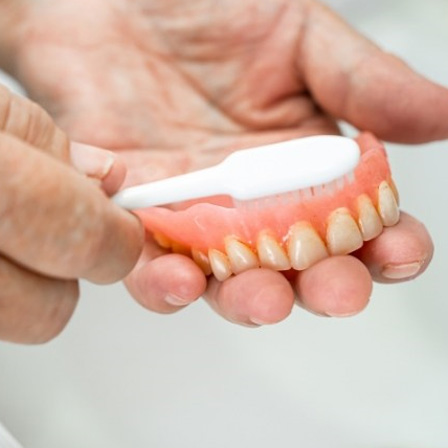
Replacing your missing teeth with dentures allows you to enjoy a more youthful appearance while also relishing the ability to eat and speak without fear or worry. However, just because all or most of your teeth are artificial does not mean that you can stop visiting your dentist for regular checkups and cleanings. Taking proper care of your new smile requires time and effort, and your dentist can be one of your greatest allies when it comes to ensuring their health and longevity. Discover what kind of maintenance is required to keep your dentures looking and feeling their best year after year.
Removable Dentures
Remove After Eating

When wearing dentures, you’ll want to make sure that you remove them after every meal. This is important so that food and bacteria do not become trapped. Plaque can remain deep within the crevices of your prostheses, so taking them out and giving them a thorough rinse will ensure no unhealthy debris remains. But be mindful that you do not use hot water, as this can warp your denture, resulting in an improper fit.
Clean Your Restoration
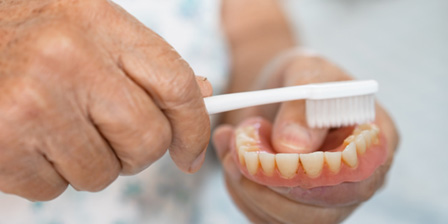
When it comes to cleaning your dentures, you’ll want to make sure that you take them out before starting your hygiene routine. This includes using a soft-bristled toothbrush and unscented hand soap, mild dish soap, or denture cleanser. This will help remove any harmful particles and food debris from your dentures so that they do not continue to irritate your teeth and gums. Make sure not to use toothpaste, as it can be too abrasive. If you do not plan to reinsert your dentures, you can place them in a container of water or a denture-cleaning solution. This prevents them from drying out and becoming brittle.
No matter what kind of solution they’re in, make sure to rinse them thoroughly before putting them back in your mouth.
Keep Your Dentures Safe
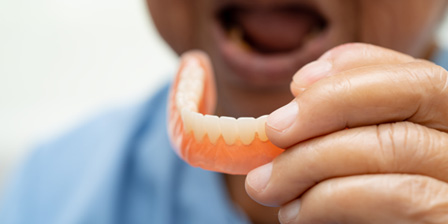
Dentures are not toys, but pets and young children may not know that, so it’s best to keep your artificial teeth up high and away from tiny hands and any four-legged friends. Also, place a towel in the basin of your sink so that there is an added layer of protection should you accidentally drop your dentures while cleaning them.
Remove Dentures When You Sleep
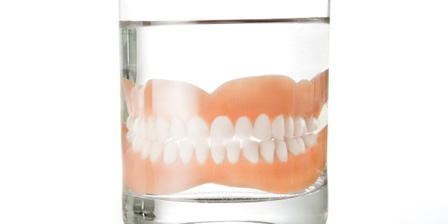
When preparing to go to bed, make sure to remove your dentures. This is essential for several reasons:
- Your gums need circulation – something that is hindered throughout the day while wearing your dentures. By removing them at night, there is less of a chance that irritation will occur.
- It lowers your risk of developing pneumonia, as plaque can accumulate beneath your denture if you continue to wear it while you’re asleep.
- It ensures that your dentures remain in a soaking solution that keeps them from drying out and losing their shape.
Notice Changes

Choosing to wear dentures means that you will likely notice changes over time. It’s important that you identify these sudden or subtle differences early on so that you can make sure to schedule an appointment with your dentist right away. Some of these might include the development of mouth sores, gum irritation, or possible infection. If you find that your dentures are damaged for any reason, do not attempt to repair them yourself. This could lead to additional harm. Just give our office a call.
Also, if you notice that your dentures shift, click, or just do not fit properly, they may need to be relined or replaced, but only your dentist will know for sure.
Understanding the Cost of Dentures

Are you ready to say goodbye to the gaps in your smile? Dentures are an excellent tooth loss solution that can help you enjoy a complete and fully functioning grin once again. Before committing to anything, you likely want to know how much your overall treatment will cost. Since every case is unique, the price can vary greatly from patient to patient. At Dental Expressions, we’ll conduct an oral examination and provide you with an accurate cost estimate so that you know exactly what to expect. To learn more, continue reading or make an appointment with our team today!
Factors That Affect the Cost of Dentures
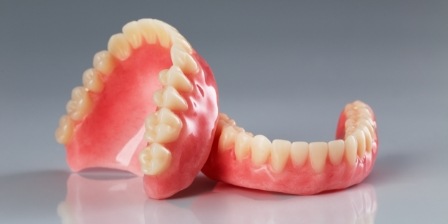
Several factors influence the total cost of dentures in Oklahoma City, including:
- Any preliminary dental work you need (i.e., tooth extractions, periodontal therapy, etc.)
- Number of teeth you’re missing
- Type of acrylic used for the base (the part that’s dyed to match the color of your gum tissue)
- Materials your replacement teeth will be made of (usually porcelain or ceramic)
If you’re on a budget, you may be tempted to opt for cheaper dentures. However, just because the prosthetics are more affordable does not mean they’re worth having. Cheap dentures tend to break easily and will require replacement much sooner than anticipated. Therefore, it’s best to go with a high-quality, durable option that will pay itself off in the long run.
Are Implant Dentures More Expensive?
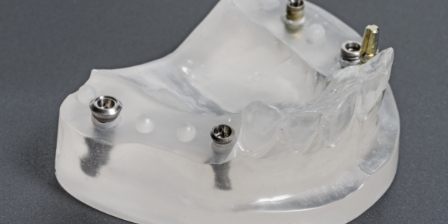
Yes, but only because they require oral surgery and the placement of multiple dental implants. Even though implant dentures have a higher upfront cost, many patients find them to be worth every penny. Thanks to their unique placement inside the jawbone, they won’t move out of place and are far more reliable for day-to-day use. They also help stimulate the jawbone, preventing its deterioration and providing unmatched stability. What’s more, implant dentures can last decades, meaning you won’t have to worry about paying for a replacement every few years.
Does Dental Insurance Cover Dentures?

Since dentures are considered a major procedure, most dental insurance plans will cover a portion of the total cost (usually about 50%). Of course, every policy is unique, and the amount of coverage given will vary from person to person. Before committing to anything, contact your insurance provider to confirm the details of your policy. Our team is more than happy to help with this step if needed.
Other Options for Making Dentures Affordable

Don’t have dental insurance? No problem! We offer CareCredit financing to help you get the treatment you need while staying within your monthly budget. This option allows you to split up the total cost of dentures into smaller installments. Plus, there are multiple low-to-no-interest plans to choose from, meaning you’re guaranteed to find something that works best for you.
Are you ready to start your journey toward a complete, fully functional smile? Give us a call and schedule your consultation today! We’ll help you accomplish your goals while keeping your expenses as low as possible.
Denture FAQs
If you suffer from extensive tooth loss, you might be thinking about restoring your smile with dentures in Oklahoma City. At Dental Expressions, we want to be as helpful as possible throughout the process of replacing your missing teeth. For your convenience, we’ve decided to answer some frequently asked questions about this popular tooth-replacement solution. If you would rather speak directly with a member of our team, don’t hesitate to reach out to us!
How long will I have to wait to get dentures after I have teeth extracted?
Most patients have to wait about six to eight weeks after they get their teeth pulled to receive dentures. Of course, the exact amount of time needed depends on the type of denture in question. Although two months may sound like a long time to wait for your new smile, it’s necessary to ensure the gums heal properly. While immediate dentures can be placed on the same day as an extraction, they’ll need to be switched out sooner since the shape of the jawbone changes during the healing period. If you’re getting implant dentures, you’ll need to wait between four to six months for the titanium posts to fuse with the surrounding bone tissue via osseointegration.
Can I sleep with my dentures?
When you first get dentures, you’ll be asked to keep them in your mouth for an entire 24 hours, including sleep. After that initial period, it’s strongly recommended that you take them out every evening before bed. That’s because when you wear dentures, they restrict the circulation in your gums, leading to soft tissue irritation and speeding up ridge resorption. Sleeping with dentures has also been found to be associated with poor oral hygiene and a higher risk of pneumonia.
What qualifies me for dentures?
Did you know that there are three different types of dentures? The requirements for each one are different too. For instance, partial dentures are ideal for patients who still have most of their teeth. Full dentures are recommended for those who lost all of their teeth or don’t have enough healthy teeth worth salvaging. Lastly, implant dentures are a great option for patients who want extra stability and have a sufficient amount of jawbone density.
Is it hard to talk with dentures?
Initially, you may have difficulty speaking with your dentures because you’re so used to talking with your natural teeth. The good news is that any lisp you develop is temporary and should go away as soon as you get used to your oral appliances. The exact amount of time it’ll take for you to get used to speaking with your dentures varies from person to person. You can speed up the adjustment process by reading aloud, repeating difficult-to-pronounce words, and having more conversations with loved ones.




